“We didn’t feel like we were in our country”: why Russians are resettling in Armenia?
A few days after the start of Russian-Ukrainian war, conversations in Russian were heard more often in the streets of Yerevan, various parts of the city and social networks started slowly filled with Russian-language announcements.
According to the Statistical Committee data, about 150 thousand Russian citizens came to Armenia, in February-April of 2022, which is three times more than the number of those who came in the same period last year.
“We no longer felt like we were living in our own country,” “We have relatives and friends in Ukraine, we were ashamed,” “We did not want to be trapped in a bubble of hatred, aggression, and fear, which were pressing from all sides”, “We lost our jobs because the employer company no longer wanted to work with Russia,” “During the protests and in social networks we feared for being prosecuted for anti-war statements”: these are some of the reasons that forced the Russians to leave the country and move to Armenia.The war had negative impact both on the people living in the hot battle zone, as well as those who, for a number of reasons, had to leave their homes and look for a new place to live. We conducted a survey among 300 Russians, who settled in Armenia, to understand their main motive for leaving Russia and coming to Armenia.

Who is leaving Russia and why?
Victoria is from Kazan, she was afraid that her husband might have been drafted into the army. "He is not of conscription age, but it is possible that he will be called up to the age of 55," she says. They moved to Yerevan with their family in early April. Victoria is a financial expert; she lost her previous job, but has already managed to find a new one.
“I am fit to be drafted during the war, I was afraid that a war with NATO would start," says Aleksey, 33, who came to Armenia from St. Petersburg with his friends in early March. Aleksey works in the IT sphere and is going to spend the next six months in Armenia. He works remotely from here.
40% of the respondents mentioned that they left Russia because they or their family member was of conscription age.
Most of the respondents are Russian citizens aged 22-39, who specialize in IT sphere.
Professional sphere and age of the respondents

Margarita moved from Tyumen to Armenia with her family. She worked in the IT field, but lost her job after the recent events. "If my husband, the main earner in our family, loses his job, we will not be able to pay the mortgage and loans." It will be very difficult to adapt and support the family," Margarita worries.
100 out of 300 respondents mentioned that due to the mass blocking of technical services, they had difficulties at work, as a result of which they moved to another country. 10% of them lost their jobs, and at the time of survey they did not find a new job.
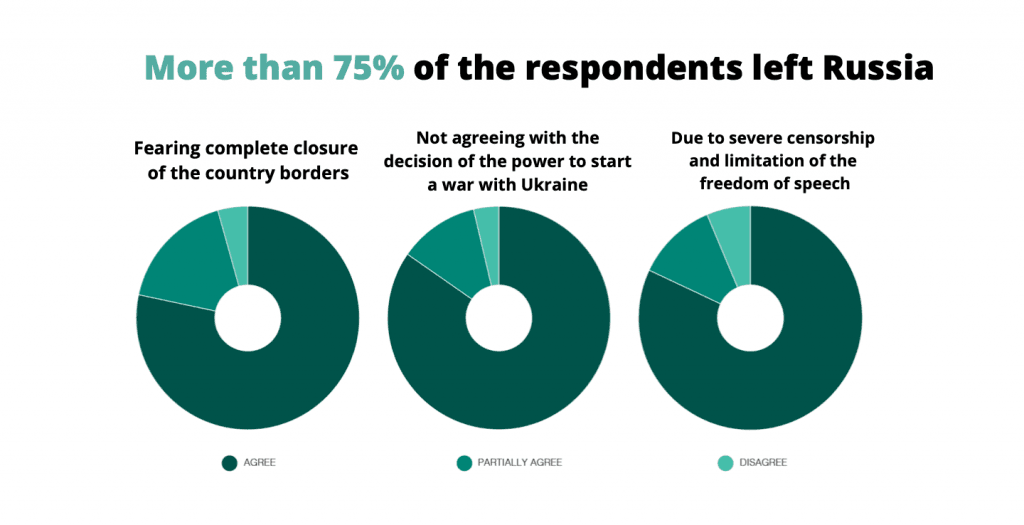
The story of journalist Maria proves the intensification of censorship in Russia and restrictions on freedom of speech. "I worked as a journalist. The prosecutor's office announced that the publications of the media outlet where I work contain extremist calls, "false" information about the war, calls to overthrow the government, etc. That was a lie, but the employees were at real risk of criminal prosecution. That was the main reason for my departure, "says Maria.
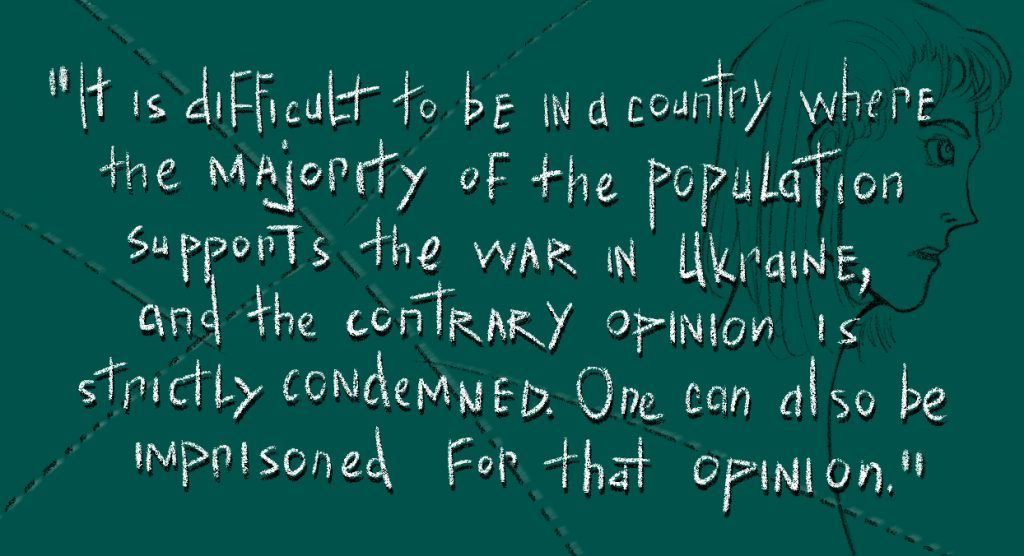
It should be reminded that after Vladimir Putin's statement on "special military operations" on February 24, "Roskomnadzor" (Federal Service for Supervision in the Sphere of Telecom, Information Technologies and Mass Communications) began to follow the publications of independent Russian media, sending warnings that they contradicted the official position of the Russian authorities.
Later, on March 4, the Law on “Fakes” was passed, defining criminal liability on “disseminating intentionally false information about the actions of the Russian Armed Forces, as well as any publication or action that discredits the Armed Forces." As a result, a number of media outlets were shut down, such as “Dozhd TV”, “Echo of Moscow”, the student magazine “Dokha”, and many others.
While compiling the survey, we were studying several well-known Telegram channels and groups, where various issues and concerns, uniting the Russians who moved to Armenia, were discussed. Thoughts of probability of starting a civil war in Russia were quite common in those groups. We added to the questionnaire the following: "I left Russia for fear that a civil war would break out."
Every second respondent stated that they fully or to some extent agree with the statement "I did not want to stay in the bubble of hatred, aggression and fear, which was pressing from all sides," 25-year-old Christina wrote in the "other notes" section of the survey. She worked in Russia in the field of organizing wedding ceremonies, now she continues to work remotely. She noted that she will return to Russia only in case of halting the war, change of government and cessation of sanctions.
“I will return to Russia if the power changes”
This is how 74% of the respondents answered the question in which case they will return to Russia. Several participants of the survey think that even a change of the power will not correct the situation: "I am afraid, that the change of the power will not change people. Only Russia's military defeat can create an opportunity for change," wrote Valeria from Moscow. And Maria from St. Petersburg does not believe in any change at all: "I do not know, to be honest, “when it will be good”, and especially how it will be good: I do not know myself. I do not believe in power in the upcoming 10 years," she says.
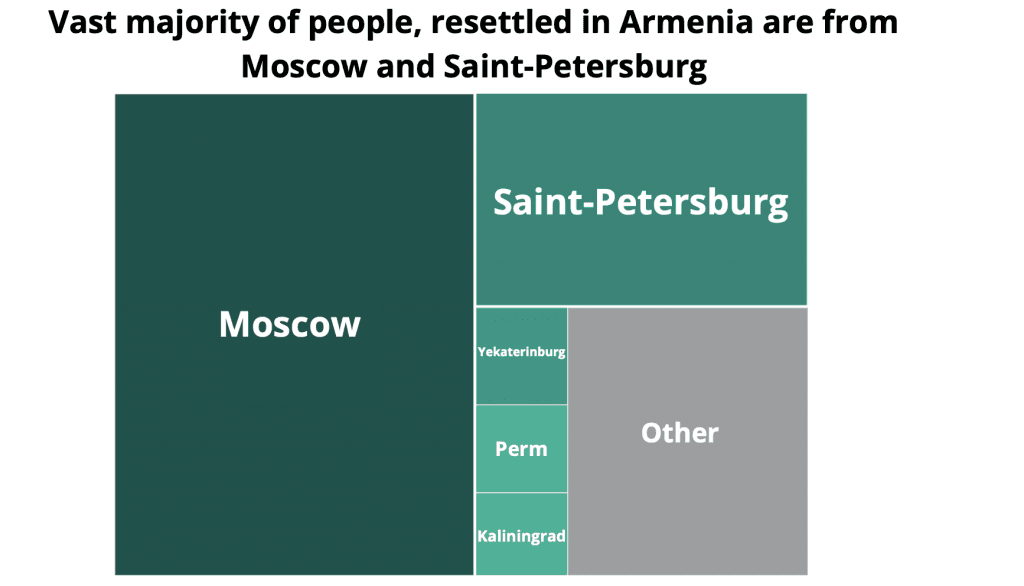
25% of respondents said they would return to Russia if the sanctions were lifted: "I will return if it is safe to live and work in international projects in Russia," "If it is safe to express your own opinion, and it will be possible to continue receiving a salary from abroad."
34% of respondents are ready to return to Russia in case the war ends. There are people among the respondents who do not even consider the possibility of returning: "Even in the event of a change of the power, there are still many people who supported the war or withdrew. I am ready to return if the majority of the population wants to go toward the future and not live with the past memories of the empire ", said Olga from Penza.
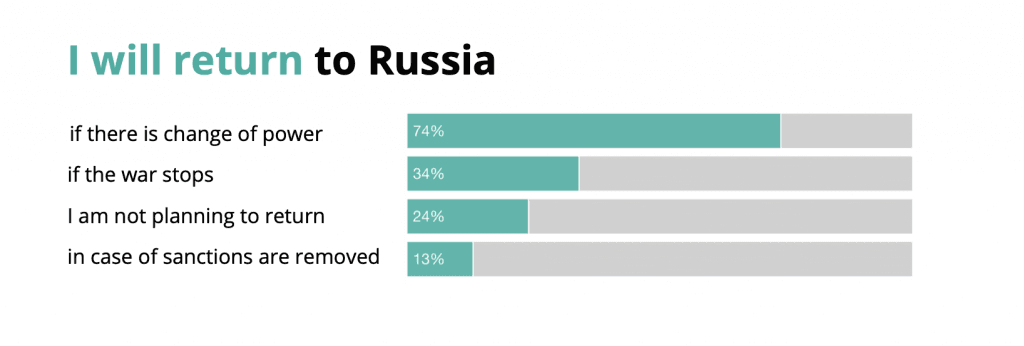
Thus, 27% of respondents are not going to return to Russia at the moment: "I am not going to return, even if the first three points (change of the power, end of the war and lifting of sanctions) become a reality right today, because Russian Federation needs a long time to recover. "I am not ready to wait for decades," said Dmitry, a 24-year-old programmer who moved to Yerevan alone, and considers Armenia as a permanent place of residence.
Why are they relocating to Armenia?
Most of the respondents mentioned that the main reason for choosing Armenia as a place of resettlement is the relatively simplified paperwork process: visa-free regime, possibility to enter the country without a foreign passport. 8% came to Armenia because the employer company has moved here.
The company, where 27-year-old Olga has been working as a manager for 1.5 years, has moved to Armenia. "Our startup is financed from Europe. Investors made it a condition that either the company should be moved out of Russia, or they will stop investing," she said.
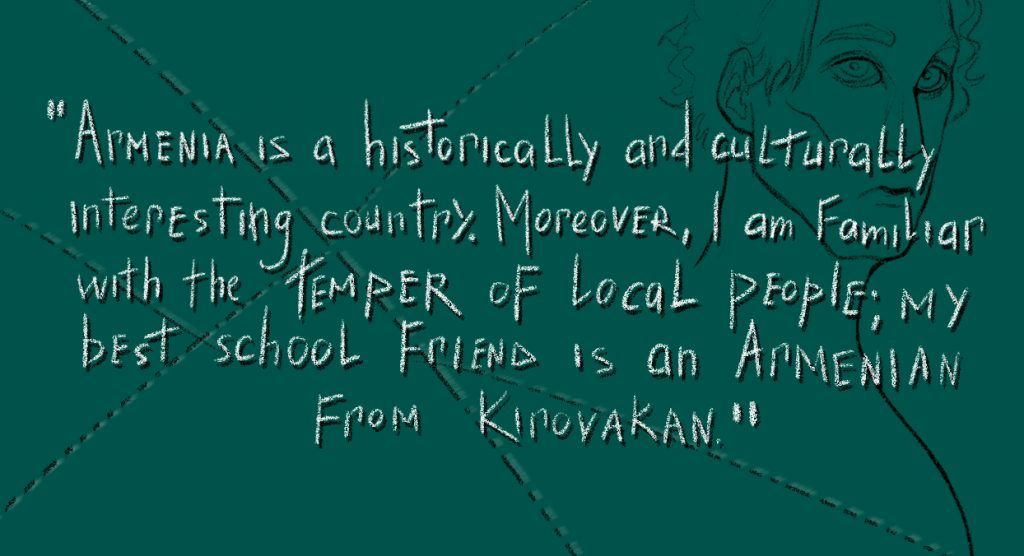
Armenia is a historically and culturally interesting country. Moreover, I am familiar with the temper of local people; my best school friend is an Armenian from Kirovakan.
Since Olga's husband was able to work remotely, they decided to move from Moscow to Yerevan. More than half of the respondents, 61%, moved with their families, 26% moved alone, and the rest came with their friends and colleagues.
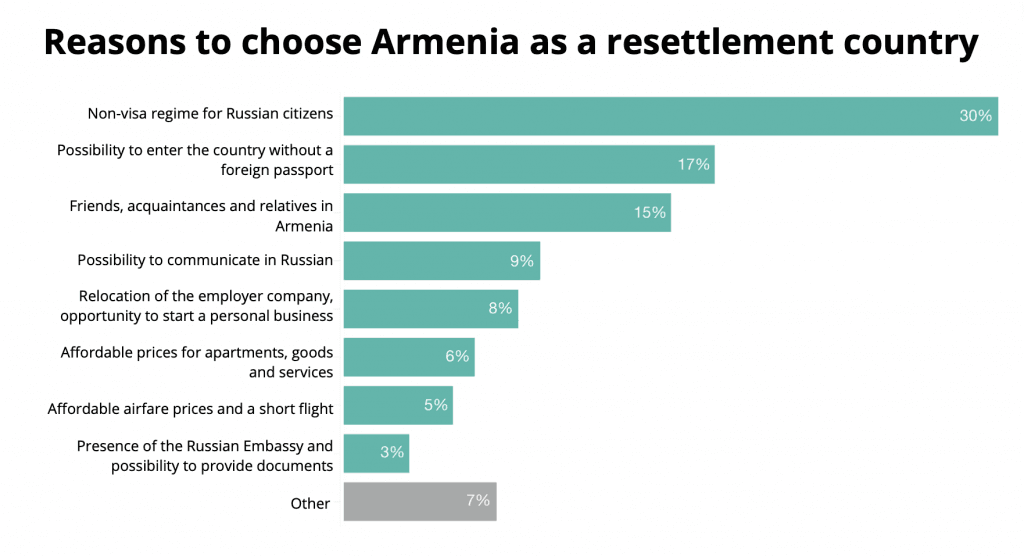
One of the not less important factors for Russians to resettle to Armenia is to have friends, acquaintances and relatives here.
Mark is a journalist from Nizhny Novgorod. He says that he was interested in the culture and history of Armenia and had a warm attitude towards Armenians just from the beginning. "I knew that Russians were treated well here," he says, adding that he and his girlfriend want to stay here and have even started learning Armenian.
Mark and two other respondents agreed to talk to us to tell the story of their resettlement in more detail.
Authors
Students
Seda
Arakelyan
Students
Lousine
Manvelyan
Students
Christina
Avanyan
Instructors
Instructors
Kate
Mamyan
Instructors
Sona
Kocharyan